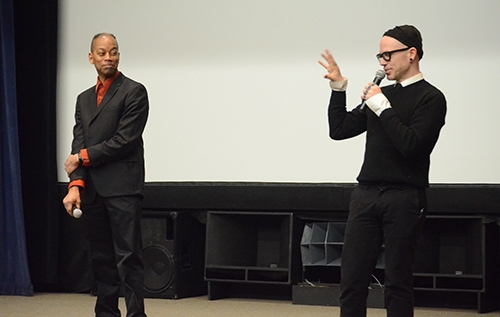Student-Organized Conference Explores 'Apathy and Action'
Error message
Could not retrieve the oEmbed resource.
MIDDLEBURY, Vt. – Two Middlebury College faculty members presented contrasting perspectives on the radical mind during the Rohatyn Center for Global Affairs’ second annual student-designed conference.
The two-day event, which was organized by four Middlebury undergraduates, was titled “Apathy and Action: Exploring Youth-Driven Movements.” It included programs on the ubiquity of student activism, ways to combat apathy, collective action in social movements, and how the environmental movement went global.
The conference engaged the Middlebury community in a wide-ranging discussion about the theory and practice of youth-led movements in the United States, Afghanistan, Hong Kong, Netherlands, Bolivia, and other countries, with presentations led by Middlebury faculty and scholars from outside Vermont.
At a session on February 19, Professor of History Don Wyatt and Associate Professor of Sociology Linus Owens discussed the radical mindset of activists. Wyatt considered the influences responsible for motivating individuals to join a movement, while Owens sought to define radicalism and how one becomes radicalized.
Wyatt referred frequently to Eric Hoffer, the American philosopher best known for his 1951 book The True Believer: Thoughts on the Nature of Mass Movements.
But the John M. McCardell Jr. Distinguished Professor at Middlebury explained that he and Hoffer “part company” on the subject of fanaticism. Where Hoffer offers a “bleak and unflattering portrait of fanaticism as an operative mode of conduct” and views it as “an element of strain or disruption,” Wyatt introduced the idea that fanaticism can contribute in a positive way to the success of a movement.
“Hoffer’s times are not our own,” he said, and while “arguing there should be more fanaticism in the world might seem counter-intuitive and even incendiary, I am left wondering if there are not potential scenarios already confronted, and in the future, where a selective infusion of fanaticism might not contribute, ironically, to a more stable, durable, and peaceful world order.
“Occupy Central or the Umbrella Movement in Hong Kong – this was the most important democracy movement in the past quarter century, since Tiananmen in 1989, and yet despite holding out for more than 100 days, this movement did not achieve its aims,” said Wyatt. “But the important thing to remember is that it is not going away. It is going to come back [and] it would seem that perhaps a bit of fanaticism might one day push such a movement over the top.”

Owens, the sociologist, took a different tack. He asked the audience of about 60 students and other members of the Middlebury community to think about what is a radical identity, what is a radical strategy, and what are radical tactics? He discussed the radical imagination, which allows the individual “to imagine the possibility of acting in a way to change the world,” and offered two ways people become radicalized.
“One is what I would call breaking the law, that moment of using the crowbar to take down the front door or [force] open a window. That moment of unexpected or unknown individual power to make the world that which you want it to be, even though the laws say otherwise” said Owens, who did extensive research with squatters in Amsterdam.
“The other is throwing stones at the police. There are so many stories of that moment, like, ‘Oh, I would never hurt a fly, I’m a pacifist, I love people and animals and things,’ but when the cops tried to throw us out of the building I just, without thinking, picked up the cobblestones and started throwing them at the police.”
People who go through an experience like that are changed forever, Owens said. “That radical moment is a threshold that once you cross, you don’t go back… radicalism only travels in one direction.”
“Once you become politicized, everything you see reminds you of your politics, right?” asked Owens. “It’s like once you get a new car, all of a sudden you see the same car everywhere. It’s the same with the politics of the radical. Once you take on this political identity, all of a sudden you are outraged by what your parents or roommates are doing, which yesterday you accepted.”
The Rohatyn Center for Global Affairs offers dozens of scholarly presentations each year designed to spark discussion and debate among students, faculty, guest speakers, and community members. Coming events in February and March sponsored by RCGA will include talks on modern Chinese poetry, economic growth in Latin America, the drug war in Mexico, and Nixon and the Vietnam War.
— With reporting and photos by Robert Keren


